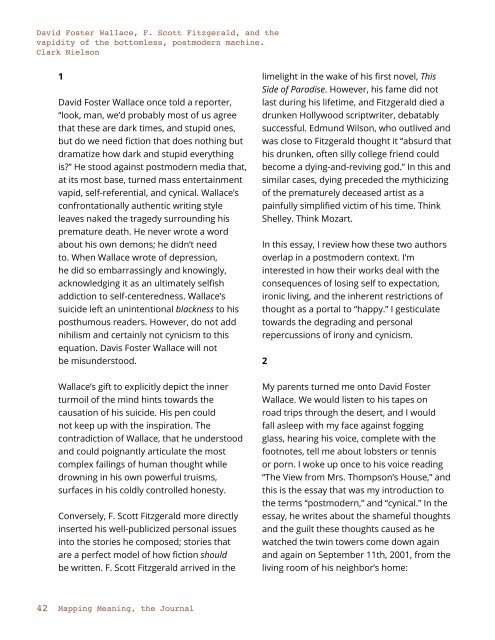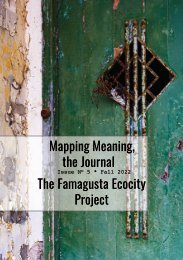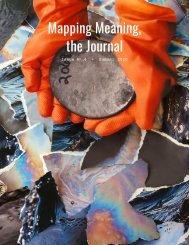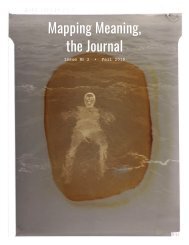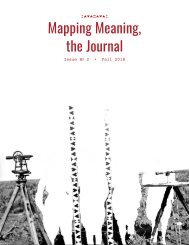Mapping Meaning, the Journal (Issue No. 1)
You also want an ePaper? Increase the reach of your titles
YUMPU automatically turns print PDFs into web optimized ePapers that Google loves.
David Foster Wallace, F. Scott Fitzgerald, and <strong>the</strong><br />
vapidity of <strong>the</strong> bottomless, postmodern machine.<br />
Clark Nielson<br />
1<br />
David Foster Wallace once told a reporter,<br />
“look, man, we’d probably most of us agree<br />
that <strong>the</strong>se are dark times, and stupid ones,<br />
but do we need fiction that does nothing but<br />
dramatize how dark and stupid everything<br />
is?” He stood against postmodern media that,<br />
at its most base, turned mass entertainment<br />
vapid, self-referential, and cynical. Wallace’s<br />
confrontationally au<strong>the</strong>ntic writing style<br />
leaves naked <strong>the</strong> tragedy surrounding his<br />
premature death. He never wrote a word<br />
about his own demons; he didn’t need<br />
to. When Wallace wrote of depression,<br />
he did so embarrassingly and knowingly,<br />
acknowledging it as an ultimately selfish<br />
addiction to self-centeredness. Wallace’s<br />
suicide left an unintentional blackness to his<br />
posthumous readers. However, do not add<br />
nihilism and certainly not cynicism to this<br />
equation. Davis Foster Wallace will not<br />
be misunderstood.<br />
limelight in <strong>the</strong> wake of his first novel, This<br />
Side of Paradise. However, his fame did not<br />
last during his lifetime, and Fitzgerald died a<br />
drunken Hollywood scriptwriter, debatably<br />
successful. Edmund Wilson, who outlived and<br />
was close to Fitzgerald thought it “absurd that<br />
his drunken, often silly college friend could<br />
become a dying-and-reviving god.” In this and<br />
similar cases, dying preceded <strong>the</strong> mythicizing<br />
of <strong>the</strong> prematurely deceased artist as a<br />
painfully simplified victim of his time. Think<br />
Shelley. Think Mozart.<br />
In this essay, I review how <strong>the</strong>se two authors<br />
overlap in a postmodern context. I’m<br />
interested in how <strong>the</strong>ir works deal with <strong>the</strong><br />
consequences of losing self to expectation,<br />
ironic living, and <strong>the</strong> inherent restrictions of<br />
thought as a portal to “happy.” I gesticulate<br />
towards <strong>the</strong> degrading and personal<br />
repercussions of irony and cynicism.<br />
2<br />
Wallace’s gift to explicitly depict <strong>the</strong> inner<br />
turmoil of <strong>the</strong> mind hints towards <strong>the</strong><br />
causation of his suicide. His pen could<br />
not keep up with <strong>the</strong> inspiration. The<br />
contradiction of Wallace, that he understood<br />
and could poignantly articulate <strong>the</strong> most<br />
complex failings of human thought while<br />
drowning in his own powerful truisms,<br />
surfaces in his coldly controlled honesty.<br />
Conversely, F. Scott Fitzgerald more directly<br />
inserted his well-publicized personal issues<br />
into <strong>the</strong> stories he composed; stories that<br />
are a perfect model of how fiction should<br />
be written. F. Scott Fitzgerald arrived in <strong>the</strong><br />
My parents turned me onto David Foster<br />
Wallace. We would listen to his tapes on<br />
road trips through <strong>the</strong> desert, and I would<br />
fall asleep with my face against fogging<br />
glass, hearing his voice, complete with <strong>the</strong><br />
footnotes, tell me about lobsters or tennis<br />
or porn. I woke up once to his voice reading<br />
“The View from Mrs. Thompson’s House,” and<br />
this is <strong>the</strong> essay that was my introduction to<br />
<strong>the</strong> terms “postmodern,” and “cynical.” In <strong>the</strong><br />
essay, he writes about <strong>the</strong> shameful thoughts<br />
and <strong>the</strong> guilt <strong>the</strong>se thoughts caused as he<br />
watched <strong>the</strong> twin towers come down again<br />
and again on September 11th, 2001, from <strong>the</strong><br />
living room of his neighbor’s home:<br />
42 <strong>Mapping</strong> <strong>Meaning</strong>, <strong>the</strong> <strong>Journal</strong>


